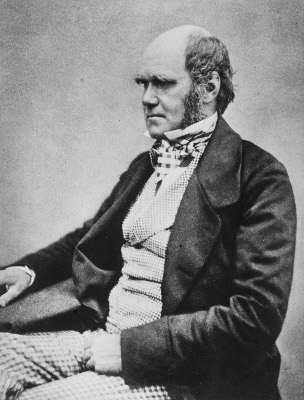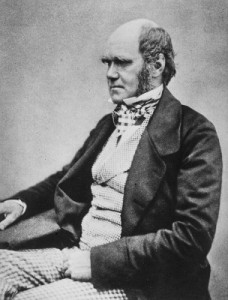Creation Corner
Without Darwin, wither faith?

Three days ago, Michael Flannery at Evolution News and Views suggested that without Darwin, the worlds of science and faith would look vastly different today. He is correct as far as he goes. But the world without Darwin would not necessarily lack its strife and its sins. It would also have a complacency the world with Darwin now lacks.
World Without Darwin
Flannery meant to review Peter J. Bowler’s Darwin Deleted: Imagining a World Without Darwin. Bowler sought to show that the world without Darwin would not differ much from the world with him. But as Flannery points out, Bowler considered only the published works, lectures, and so on of and by Darwin. He did not consider the published works and acts of those who came under the influence of Darwin. It’s not enough to suggest that without Darwin, someone else would have done the same as he did. If a man is influential enough, then without that man, entire movements might never be.
Your editor can illustrate that principle with Eliezer Itzhak Perelman, whom history knows as Eliezer Ben-Yehuda. Most of those who remember him say:
Before Ben-Yehuda…Jews could speak Hebrew. After him, they did.
That does not do him justice. Without Eliezer Ben-Yehuda, Hebrew would never have become the national language of Israel. It would have stayed a curiosity, a “dead language,” like Latin, fit for liturgy only. (It’s not even safe to say it would be fit for the occasional High Priestly Encyclical. For neither High Priest nor Sanhedrin today hold the prominent place of The Pope or The College of Cardinals.) More than that, Eliezer Ben-Yehuda made modern Hebrew what it is. He laid down the principles that enable modern Hebrew to handle modern concepts, concepts that King David never heard of.
Likewise, Charles Darwin was the founding High Anti-priest of the anti-faith we call “evolution” today. Michael Flannery shows this many times:
- Without Darwin, even Charles Lyell and Alfred Russell Wallace would have settled for a world of gradual change with intelligence, even Divine, guidance. Those two would have been “theistic evolutionists” – long-agers, that’s true, but not atheists.
- Without Darwin, the infamous X-Club would not have formed. Or if it did, it would never have succeeded in turning science explicitly atheistic.
- Without Darwin, most of all, methodological naturalism would never have taken hold.
That last point needs emphasis. Methodological naturalism says that no apparent, perceived or claimed evidence, in any field whatsoever, can be valid if it posits any supernatural agent or agency. Judge E. Jones III’s infamous ruling in Kitzmiller v. Dover enshrined methodological naturalism into our law. Flannery attributes this “explicit materialism” specifically to Darwin, and with good reason.
Uniform complacency
But would a world without Darwin be a world of proper faith? No. Because a world without Darwin would belong to the long-agers. Hugh Ross, meet your spiritual ancestor: Alfred Russell Wallace. Not repeat not Martin Luther, or Leonardo da Vinci.
In the world without Darwin, uniformitarianism would still hold sway. Scientists in that world would see nothing wrong with imagining gradual change. They would interpret the Cambrian Explosion as the real expression of the Fifth Day in Genesis chapter 1. (And what about the plants growing on the Third Day? Blank-out.). And the Noahic Flood? Local at best.
This is nothing new. Floyd Nolen Jones (The Chronology of the Old Testament) showed that Ptolemy Soter’s Seventy Interpreters first tried to introduce gradual change into the Bible. Their Septuagint (Latin Interpretatio Septuaginta, Greek Hermeneutica kata ton Hevdomékonta, “Interpretation According to the Seventy”) postpones the named sons of the Patriarchs, and even lengthens life spans of the earliest descendants of Shem. (Jones, op. cit., p. 11ff) Why? To remove the impression that after the Flood, the life span of man fell ninety percent, and in a hurry.
To a gradualist, nothing happens in a hurry. The Greeks were gradualists. So were King Ptolemy and his court at Alexandria. And they interpreted the Tanakh, what we call “The Old Testament,” according to their tradition and world view.
Darwin took the matter one radical step further. Darwin, like Friedrich Nietzsche, said God did not exist. When he did that, he challenged people of faith to a war that still rages today.
Without Darwin, faith might be more widespread. But Lyell and Wallace would have watered it down. Would anyone have seen the need to challenge the gradualism and uniformitarianism of Lyell and Wallace? Maybe not. Maybe it took abiogenesis and “common descent” to galvanize people to action.
So without Darwin, William Jennings Bryan would never have even tried to prosecute John T. Scopes. Recall that Bryan admitted to Clarence Darrow, in open court, that he accepted a “long age” as reasonable.
Of frogs and hot and cold water
Throw a frog into boiling water and he will jump out at once. But put a frog into a saucepan and simmer him, and he will readjust his body to the ever-warmer water around him, until before he knows it, he’s cooked. Literally.
The world without Darwin would have been the slow cooker of the faith. Would Henry Morris and John C. Whitcomb have written The Genesis Flood? Would John Woodmorappe have studied whether Noah’s Ark could have sailed? Would Walter T. Brown have tried to stand geology, astronomy, and even nuclear physics on their heads with his counter-revolutionary theory of creation and the Global Flood? (Though Dr. Brown might say the evolutionists, not he, turned those disciplines on their heads. And he can probably prove it, too, if anyone will debate him.) Each of these men (that is, those who still live) will have to answer that question for himself. But the challenges they made to orthodox science would scarcely be as compelling in a world that “didn’t want to go to extremes.”
The atheists went to extremes, and followed Darwin’s lead. They drew the battle lines. We must join that battle, and pay Darwin a warrior’s respect, even if that’s not the kind of respect he might have wanted.
[subscribe2]
Terry A. Hurlbut has been a student of politics, philosophy, and science for more than 35 years. He is a graduate of Yale College and has served as a physician-level laboratory administrator in a 250-bed community hospital. He also is a serious student of the Bible, is conversant in its two primary original languages, and has followed the creation-science movement closely since 1993.
-

 Executive4 days ago
Executive4 days agoSecret Service chief gets no solace
-

 Executive3 days ago
Executive3 days agoWaste of the Day: Louisville Taxpayers Pay Nearly $600,000 For Empty Building’s Maintenance, Security
-

 Guest Columns5 days ago
Guest Columns5 days agoFear Itself: Democrats’ Favorite Strategy Caused Their Current Chaos
-

 Executive3 days ago
Executive3 days agoWhere is Joe Biden – or Jill?
-

 Executive2 days ago
Executive2 days agoWaste of the Day: Throwback Thursday: Cities Used Crime Prevention Funds on Soccer Games, Paper Shredding
-

 Executive2 days ago
Executive2 days agoFacile and politically motivated suggestions
-

 Civilization5 days ago
Civilization5 days agoBuild Iron Dome in the United States To Prepare for Israel’s Worst Day
-

 Executive2 days ago
Executive2 days agoBiden makes farewell whisper














[…] Reprinted from Conservative News and Views […]
Michael Alan Kline Sr liked this on Facebook.
“Darwin, like Friedrich Nietzsche, said God did not exist”
[citation needed]
A simple Internet engine search ought to confirm that.
“A simple Internet engine search ought to confirm that.”
Bet it won’t. Darwin wasn’t an atheist. He was agnostic. He didn’t think the question of a god’s existence could be answered.
Then why did he promulgate an explicitly atheistic paradigm?
I tried that and nothing came up. Do you have a quote or passage from Darwin where he said something close to that?
I cite his entire body of work. I say that’s what it amounted to.
“I cite his entire body of work. I say that’s what it amounted to.”
Ah, so when you say “Darwin, like Friedrich Nietzsche, said God did not exist,” you’re using a kind of rhetorical version of the word “said”? Seems like you could, hypothetically, use that to put words in someone’s mouth!
With men like the ones under discussion, that isn’t too hard.
“With men like the ones under discussion, that isn’t too hard.”
Indeed, putting words in people’s mouths isn’t hard. Honest journalism, on the other hand, is.
I don’t merely repeat what people say. I repeat also what they mean. Or at least, what their words mean – logically – whether they realized fully what they were saying or not.
And sometimes, actions speak louder than words. So I repeat the meanings of those actions.
Terry wrote:
(Though Dr. Brown might say the evolutionists, not he, turned those disciplines on their heads. And he can probably prove it, too, if anyone will debate him.)
Geno answers:
Dr. Walt Brown’s debate offers are a sham. He claims in 32 years he has been unable to find a debate. Yet, there are creationist publications that would be delighted to host a debate between Brown and those who disagree with him. In fact, Dr. Brown has never presented his hydroplate model in any scientific forum for the analysis and criticism of the scientific community ….. not even creationist scientists.
The reason Brown doesn’t get any debates is because his terms and conditions are both unreasonable and non-negotiable. For example, he requires a PhD for anyone to engage him in a written debate. The reason he gives for this is so there will be no claim of a mis-match with a less qualified opponent. It is worth note that in a written debate, there is an opportunity to do fact-checking and research which would level the playing field between Brown and his opponent. On the other hand, Brown offers those without a PhD an opportunity to debate him verbally where Brown has a polished presentation and his (less qualified) opponent will have no opportunity for fact checking and research on what may be highly technical issues. It is clear an opponent without a PhD would be under a much greater disadvantage in the verbal debate (which Brown says he will accept) than the written debate (which Brown refuses to grant).
Brown has also said he insists on the verbal debate so his (less qualified) opponent can’t “cover up” not having done their “homework” by looking up things between sessions …. an opportunity that is available to anyone participating in the verbal debate. Further his verbal opponent can be “disqualifed” for not having done this “homework.”
Finally, Brown wants to be able to bring up a couple dozen topics which leaves his opponent open to victimization by the (in)famous “Gish Gallop.”
The last thing Brown wants is a real debate of the scientific merits of his claims on a level playing field.
The above is, of course, a matter of opinion.
When a man refuses to read any further in a book than a particular point that he thinks the author of that book cannot and does not support, and won’t even consider that the support lies in the part of the book that he hasn’t gotten to, then such a man cannot come into a debate and call himself adequately prepared. Not with any justice he can’t.
As to the academic requirement, Dr. Brown sets that so that anyone seeking to challenge his account would have no cause to complain that he could not have won because something that Dr. Brown said “went over his head,” or some such thing.
Geno here really ought to ask himself why he wouldn’t be able to line up a PhD team captain for his side. That reflects on the available pool of PhD-level team captains, not necessarily on Geno. It suggests that the PhD’s know they’ll likely lose and won’t admit even that they could lose.
“I don’t merely repeat what people say. I repeat also what they mean. Or at least, what their words mean – logically – whether they realized fully what they were saying or not.
And sometimes, actions speak louder than words. So I repeat the meanings of those actions.”
So in other words, the statement should read “Darwin, through my interpretation of his writings, implied God did not exist. This is much unlike Friedrich Nietzsche, who literally did say that God did not exist.” Your use of the word “said” is incorrect if that’s really what you’re trying to say, and dishonest in that it might mislead people into thinking he actually said that, especially when his views on the matter are very well documented in his writings and don’t say anything close to what you’re saying.
Not everything is black and white, Terry. I know you don’t like Darwin, but you don’t need to attribute everything you find bad to him just because of that. I’d love to believe he’s an atheist, but I’m not about to count him as one just because I’d like it to be true.
I expect more of someone who, like Darwin, made his living with words, than I expect of the average person.
Words mean things.
“I don’t merely repeat what people say. I repeat also what they mean. Or at least, what their words mean – logically – whether they realized fully what they were saying or not.”
It must be very satisfying to live in a world where you can attribute dubious statements to an individual, while claiming that individual need not have actually said those words or any approximate variation of those words for it to be considered truthful. The sense of entitlement and ignorance of journalistic responsibility in that perspective are astonishing.
Can you show that Charles Darwin never meant to obviate God in his writings?
I deal regularly, as in Darwin’s case, with people who don’t always say all that they mean, and who not only do not mean what they say, but often do not mean what they think they mean.
“Can you show that Charles Darwin never meant to obviate God in his writings?”
If by obviate you mean “remove / eliminate a danger or difficulty” I have no clue what you’re supposing Darwin did. If he believed God existed (though you claim otherwise) he could have been attempting to obviate Him by obscuring or eliminating His influence on humanity by proposing an alternative solution to the development of life that, to his incredible luck, was eventually embraced by the scientific community. That isn’t true as far as I know but whatever.
If he didn’t believe in a God, as you claim, what kind of ‘difficulty’ would his writings have been obviating? Is there any written evidence that he considered others’ beliefs to be a threat to his daily life? Did he consider religion an annoyance, a hindrance, something to be actively opposed and eliminated? And no, ‘I’m just interpreting his body of work as a whole’ or something like that isn’t a real answer.
“I deal regularly, as in Darwin’s case, with people who don’t always say all that they mean, and who not only do not mean what they say, but often do not mean what they think they mean.”
For the first two qualifiers – people who ‘don’t always say all they mean’ and ‘do not mean what they say’ – you’ve just described a side-effect of speech experienced regularly by every adult on Earth capable of communication. So you have license to interpret their words as you see fit in an effort to discredit them. That’s incredibly convenient for you, isn’t it?
For the final one – people who ‘do not often mean what they think they mean’ – you really lost me. How can someone not mean what they think they mean? The intended meaning of a statement is completely up to the speaker to decide.
To “obviate” anything is literally to “get it out of the road.” And that is what Charles Darwin, from his own perspective, did, or thought he did: get God out of the road. He said, in effect, that life began from non-life, and changed all by itself, with nothing and no-One to guide it.
If that is not true, then his intellectual heirs would never feel the need to conflate “intelligent design” with “creationism.” Yet they do it every time.
I am fighting an intellectual war. I haven’t the luxury of granting that quarter known as “the benefit of the doubt.” Any distinction between intention and effect becomes incompetent, irrelevant, and immaterial, in judging the effect an historical figure had on the world around him.
The atheist side gives no quarter. Neither will I.
“Then why did he promulgate an explicitly atheistic paradigm?”
He didn’t. He gave an explanation of something he had observed. He was talking strictly about biology, not religion, and the only mentions of gods in his work were anything BUT atheistic.
Terry claims:
When a man refuses to read any further in a book than a particular point that he thinks the author of that book cannot and does not support, and won’t even consider that the support lies in the part of the book that he hasn’t gotten to, then such a man cannot come into a debate and call himself adequately prepared. Not with any justice he can’t.
Geno answers:
Some claims are just so bad further research simply isn’t necessary. My challenge to Dr. Brown’s model is based on the energy release. Brown claims the energy of 1800 trillion hydrogen bombs. If we distribute this energy evenly over a period of 40 days, that would be the equivalent of more than 40 hydrogen bombs in a fairly typical bedroom… or 66,000 hand grenades per second. (I realize the energy distribution of Brown’s claims is not equally distributed.)
Putting this another way, one megaton is 4.18e15 joules. That would make 1800 trillion hydrogen bombs (at only 1 megaton each) equal to 7.52e30 joules. The mass of Earth’s atmosphere is 5e18 kg and air has a specific heat of 1003 J/kg. That means only 5.02e23 joules would raise the heat of Earth’s atmosphere by 100C (180 F). That is only 0.000006% of the energy Brown says was released. In other words, Brown can get rid of 99.999994% percent of the energy any way he wants and the remaining 0.000006% will cook the planet.
Terry claims:
As to the academic requirement, Dr. Brown sets that so that anyone seeking to challenge his account would have no cause to complain that he could not have won because something that Dr. Brown said “went over his head,” or some such thing.
Geno answers:
That amounts to an argument that something is more likely to go “over the head” of Brown’s opponent in a verbal debate where time for research is not available and no PhD is required, than in the written debate where time for research is available and a PhD is required. In a word, that argument is simply “absurd.”
Terry wrote:
Geno here really ought to ask himself why he wouldn’t be able to line up a PhD team captain for his side. That reflects on the available pool of PhD-level team captains, not necessarily on Geno. It suggests that the PhD’s know they’ll likely lose and won’t admit even that they could lose.
Geno answers:
As Terry stated in his opening comment…. “That is a matter of opinion.” The PhD’s I’ve contacted have basically said Brown’s model is so improbable it isn’t worth their time or trouble. That said, there are PhD’s who have attempted to engage Brown in a debate and failed.
It is worth note that creation.com has extended Brown a number of opportunites to present (and defend) his model in their pages, yet he refuses to do so.
Dr. Walt Brown has no real interest in presenting his model in a scientific forum, nor has he any interest in defending it from a scientific perspective.
If Brown won’t take on a serious debate, how about you, Terry? As I understand it, you have an engineering degree so we’d be fairly evenly matched.
Terry wrote:
If that is not true, then his intellectual heirs would never feel the need to conflate “intelligent design” with “creationism.” Yet they do it every time.
Geno:
Could it be that ID and creationism have such a large overlap they are virtually indistinguishable?
For example, we have the Discovery Institute’s “Wedge Document” which lays out the strategy for the ID movement and was written by an ardent creationist.
Then there’s always the creationist book that was reworked to be an ID book…. unless you have some other meaning for the term “cdesign proponentists.”
About the only differences I see between them is ID seeks to avoid the debate over the age of the Earth. The reason for that is, to me, pretty obvious…. it increases the number of supporters for ID in order to give greater political strength.
Since you’re the first person to say a word about any “wedge document,” I challenge its existence.
Besides, I’ve conversed with many ID advocates. Enough to understand that these workers are not creationists.
“Since you’re the first person to say a word about any “wedge document,” I challenge its existence.”
Ah, I really wouldn’t go there if I were you…
Do you know anything about this so-called document, then?
Don’t plead ignorance, Terry.
Of what?
First, I note Terry didn’t comment on the conversion of a creationist book to an Intelligent Design (ID) book by little more than replacing references to creation with reference to design. Hence “cdesign proponentists” when one of the substitutions was messed up.
Second, with reference to Discovery Institute’s (DI) “Wedge Document.” DI is probably the leading organization advocating ID and was founded by creationist lawyer Phillip Johnson. Johnson developed the “Wedge Strategy” with the intent of using ID as a “wedge” to replace evolution with creation. DI does not deny the document. However, they claim it was intended as a fundraiser rather than a strategic plan. I have to ask…. how many fundraising documents have you gotten that don’t even mention money or the need for it?
Without further comment, I give you the Wedge Strategy:
Link: link to antievolution.org
excerpts:
The proposition that human beings are created in the image of God is one of the bedrock principles on which Western civilization was built…..
Discovery Institute’s Center for the Renewal of Science and Culture seeks nothing less than the overthrow of materialism and its cultural legacies. ….
The very beginning of this strategy, the “thin edge of the wedge,” was Phillip ]ohnson’s critique of Darwinism begun in 1991 in Darwinism on Trial, and continued in Reason in the Balance and Defeatng Darwinism by Opening Minds. Michael Behe’s highly successful Darwin’s Black Box followed Johnson’s work. We are building on this momentum, broadening the wedge with a positive scientific alternative to materialistic scientific theories, which has come to be called the theory of intelligent design (ID). Design theory promises to reverse the stifling dominance of the materialist worldview, and to replace it with a science consonant with Christian and theistic convictions.
Goals: To replace materialistic explanations with the theistic understanding that nature and hurnan beings are created by God….
To see design theory permeate our religious, cultural, moral and political life.
Objectives: Mainline renewal movements begin to appropriate insights from design theory, and to repudiate theologies influenced by materialism …. Major Christian denomination(s) defend(s) traditional doctrine of creation & repudiate(s) …. Positive uptake in public opinion polls on issues such as sexuality, abortion and belief in God
Geno concludes….. That should do.
I do not comment on stories that I hear first from my intellectual adversaries, who would have a motive to lie to me. (And, I maintain, have lied to me before this.)
That site is so bad that it even gives “amateurish” a bad name. I suggest to anyone even thinking of following that link: don’t bother. It is a fraud of a particularly invidious kind: a frame, and not a very elaborate frame either.
Maybe you set that up, Geno. It wouldn’t surprise me in the slightest.
If any part of that site had any basis in fact, Eugenie C. Scott of the National Center for Science Education (which really ought to call itself National Co-ordinators of Perpetuating the Evolutionary Fraud in Government Schools) would be all over that and would never stop talking about it.
Absolutely nobody would publish anything like that if he really “meant it.” Certainly not on a site that allowed access without so much as a password. A link like that, to anything other than the home page, should lead to an HTTP 403 error page.
“Do you know anything about this so-called document, then?”
Yes. So do the DIscovery Institute. They’ve admitted writing it.
That’s not quite the impression I get from the “explanation” you linked to later.
“Eugenie C. Scott of the National Center for Science Education (which really ought to call itself National Co-ordinators of Perpetuating the Evolutionary Fraud in Government Schools) would be all over that and would never stop talking about it.”
Eugenie Scott (an extremely pleasant person, by the way) has talked about the Wedge Document at length. NCSE discuss it here:
link to ncse.com
Just so everyone knows: I have no independent corroboration that the Discovery Institute’s document is the same as the document at the site calling itself “antievolution.com.”
The Discovery Institute’s explanation of the Wedge Document:
link to discovery.org
“Just so everyone knows: I have no independent corroboration that the Discovery Institute’s document is the same as the document at the site calling itself “antievolution.com.””
You don’t? No problem; here you go:
link to discovery.org
‘Just so everyone knows: I have no independent corroboration that the Discovery Institute’s document is the same as the document at the site calling itself “antievolution.com.”’
Seeing as how DI isn’t about to host the paper anymore since it’s been a bit of an embarrassment, you can dig up an archive of their website:
link to web.archive.org
Which is the exact intro to the wedge document. If you want a scan of the original document, see here:
link to antievolution.org
Terry wrote:
I do not comment on stories that I hear first from my intellectual adversaries, who would have a motive to lie to me. (And, I maintain, have lied to me before this.)
Geno answers:
So, rather than inspect the documentation, you simply reject if because of the source and call that source a liar. Would you care to back that (unfounded) allegation up?
On the other hand, you claimed had agreed to a debate with Dr. Brown and backed out. IIRC, the term you used was “lily-livered.” The fact is there never was an agreement between Brown and I for a debate, and you knew (or should have known) it.
Terry wrote:
That site is so bad that it even gives “amateurish” a bad name. I suggest to anyone even thinking of following that link: don’t bother. It is a fraud of a particularly invidious kind: a frame, and not a very elaborate frame either.
Geno answers:
A second unsubstantiated accusation of misconduct.
Terry wrote:
Maybe you set that up, Geno. It wouldn’t surprise me in the slightest.
Geno answers:
A third unsubstantiated allegation of misconduct.
How about if you could read the document directly from the source? DI provides access to a copy at their website. Fergus provided the link. Will you now accuse me of hacking the DI website and setting up a dummy document?
Terry wrote:
If any part of that site had any basis in fact, Eugenie C. Scott of the National Center for Science Education … would be all over that and would never stop talking about it.
Geno answers:
Do you mean like this:
link to ncse.com
and this:
link to ncse.com
and this:
link to ncse.com
and this:
link to ncse.com
and another 150+ hits on a search at the NCSE website? Is that what you mean?
Terry wrote:
Absolutely nobody would publish anything like that if he really “meant it.” Certainly not on a site that allowed access without so much as a password
Geno answers:
IIRC, the “Wedge Strategy” document became public as the result of an internal “leak.” DI confirms the autheticity of the Wedge Strategy document. They claim it was intended as a fundraiser. Fergus has provided a link to DI’s statement. If it was intended for use as a fundraiser, it’s the only one I’ve ever seen that never mentioned money or a need for money.